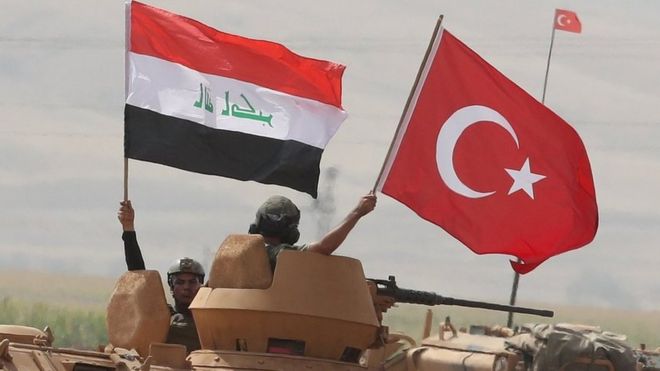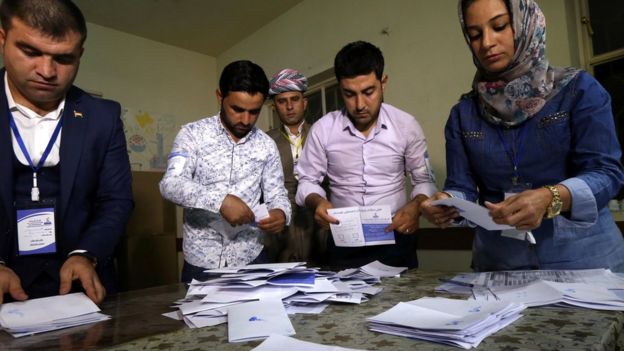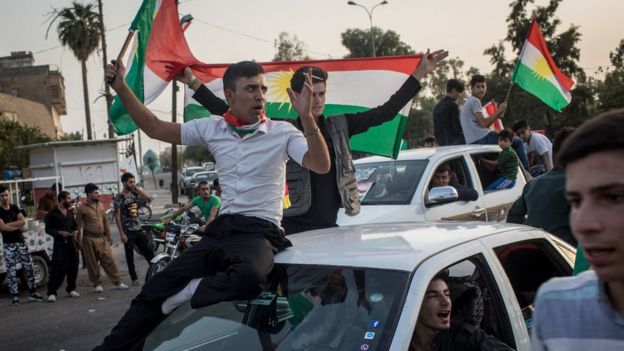 EPA
EPA
Turkey's president has said Iraqi Kurds could go hungry as a result of the punitive measures it is considering after Monday's independence referendum.
Recep Tayyip Erdogan accused the head of the Kurdistan Regional Government of "treachery" for pressing ahead with the vote despite international opposition.
Massoud Barzani should now "give up on this adventure", he said.
Mr Erdogan has previously threatened to cut a vital Kurdish oil pipeline and stop lorries crossing Turkey's border.
Turkey fears that the emergence of an independent Kurdish state on its border will stoke separatist feeling in its own Kurdish minority.
The results of the referendum are yet to be declared, but a "yes" vote is expected.
 AFP
AFP
Kurdish leaders say that would not automatically trigger a declaration of independence, but rather give them a mandate to start negotiations on secession with the central government in Baghdad and with neighbouring countries.
Iraqi Prime Minister Haider al-Abadi ruled out any such talks on Monday night, saying he would not discuss the referendum's results because it was "unconstitutional".
This was the strongest rhetoric yet from President Erdogan on the Kurdish referendum. He called it "treachery" and a "threat to national security". Once again he threatened military or economic intervention, without elaborating.
Turkey is worried that independence might further Kurdish insurgency here and is concerned for ethnic Turkmen in the city of Kirkuk, which the Kurds want to be part of any future state. But there was a lot for a domestic audience - sabre-rattling to please nationalists at home.
Ankara has built a strong relationship with the Iraqi Kurds through an oil pipeline that feeds the Kurdish economy and Turkey's energy needs. And the authorities in Irbil oppose the PKK Kurdish militant group, allowing Turkish military bases in northern Iraq. Mr Erdogan warned he could close the oil valves in Turkey - but it has not yet happened.
With Turkey's notoriously abrasive president, the oratory sometimes does not actually translate into action.
In a speech on Tuesday, Mr Erdogan said he had expected "until the last moment" that Kurdistan Regional President Massoud Barzani would postpone the vote.
"This referendum decision, which has been taken without any consultation, is treachery," he said."If Barzani and the Kurdish Regional Government do not go back on this mistake as soon as possible, they will go down in history with the shame of having dragged the region into an ethnic and sectarian war," he warned.
Mr Erdogan said Turkey, which has long been the Kurdistan Region's main link to the outside world, might now impose sanctions to persuade Mr Barzani's administration to "give up on this adventure that can only have a dark end".
"It will be over when we close the oil taps, all [their] revenues will vanish, and they will not be able to find food when our trucks stop going to northern Iraq," he added.Cross-border trade between the Kurdistan Region and Turkey was worth some $5bn (£3.7bn) in the first six months of 2017, according to Kurdish officials, while hundreds of thousands of barrels of oil flow daily through a pipeline from Kurdish-controlled oil fields to the Mediterranean via Turkish territory.
Iraqi soldiers also joined Turkish troops for military exercises in south-eastern Turkey on Monday, near the border with Iraq.
The US earlier said it was "deeply disappointed" that the Kurdistan Region held the referendum, but stressed that their "historic relationship" would not change.
 GETTY IMAGES
GETTY IMAGES
The referendum was held in the three Iraqi provinces that make up the Kurdistan Region, as well as in adjoining disputed areas claimed by the Kurds and the Arab-led central government that are controlled by Kurdish Peshmerga forces.
The Kurdish news agency Rudaw reported that 72% of the 5.2 million Kurds and non-Kurds registered as resident in those areas had voted. Ballots were still being counted on Tuesday, with initial results expected by the end of the day.
Kurds are the fourth-largest ethnic group in the Middle East but they have never obtained a permanent nation state.
In Iraq, where they make up an estimated 15% to 20% of the population of 37 million, Kurds faced decades of repression before acquiring autonomy in 1991.





